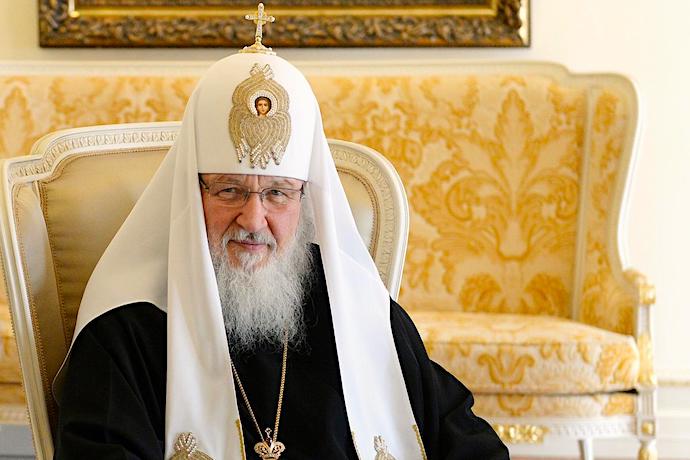Since the start of the war in Ukraine, Patriarch Kirill, the leader of the Russian Orthodox Church, has been complicit in the political rhetoric used by Vladimir Putin. In one of her first articles on the topic, Katie Kelaidis reminded readers that the Orthodox holiday (or holy day) of Forgiveness Sunday (March 6, 2022) would be the ideal moment for Kirill to impose spiritual sanctions on Putin, and to call for an end to the horrific violence and loss of life caused by his hubris and ideological malfeasance.
Yet, Kirill chose not to condemn Putin in his sermon for Forgiveness Sunday; rather, he dug his heels deep into the sticky mud of denial and opted instead to condemn western civilization, homosexuality, and political freedom for the special operation in Ukraine’s eastern Donbas region. His sermon brought to the fore the language of the globalized culture wars, in which salvation—political and spiritual—is framed in the fascist language of us-versus-them. With this sermon, Kirill has laid bare to the watching world his ideological bent, his vision for the future—one of traditionalism, purity, and Russian authoritarianism.
As a scholar who studies far-right American converts to the Russian Orthodox Church Outside of Russia (ROCOR), I was not shocked by Kirill’s sermon. In fact, I was waiting for it. Converts to ROCOR, often from evangelical backgrounds, use the language of the culture wars, combined with Christian nationalism and traditionalist philosophies of the body, to express their fears about secularism, gay and trans rights, feminism, abortion—the list is endless.
By traditionalist philosophies, I mean ideas that focus on the defense of what they view as the primordial and universal truth, angst about racial and sexual purity, and fears over white extinction, particularly in the strain espoused by Julius Evola, a right-wing thinker much favored in fascist Italy who is currently invoked across Europe by radical groups. Together these ideas provide a language for traditionalist Orthodox—or what I call Reactive Orthodox—to express their worldbuilding project of moral securitization for the future.
Crucial to their platform is the idea that a return to a broadly-cast tradition, not limited to, but most often conjured through, firm social boundaries and gender binaries—is needed to thwart secular modernity. Aspiring to everything modernity is not, Reactive Orthodox make use of storied thematic elements—a triptych of family, morality, and purity long associated with white Christian hegemony—to make their political vision a future transnational reality. Kirill’s Forgiveness Sunday sermon is an exemplary piece of trad futurism propaganda.
Forgiveness Sunday marks the day before Lent in the Orthodox liturgical calendar, and during the vespers (prayer) service in the afternoon, parishioners and clergy bow to each other and ask forgiveness. It’s a highly kinetic service. Bows. Prostrations. Kisses. Weeping. It’s a service meant to bring out humility and social solidarity. The fact that Kirill used this Sunday to politicize the death of innocent Ukrainians is theologically corrupt.
The sermon, which has yet to be officially translated into English, opens in a similar fashion to many of Kirill’s public speeches. He congratulates the faithful on the religious holiday; then moves on to talk about how spring is a time of growth and resurrection, but quickly mentions that this season is overshadowed by the political upheaval in Donbas. From there Kirill takes a hard Right turn into a critique of freedom, suggesting that the people of Donbas rightly opposed the freedom of western civilization because it brought with it a test of faithfulness to God—i.e. pride parades (это гей-парад).
By not giving in to this sin, Kirill argues that Donbas (and seemingly Russia as well) are thus strangers to the world (то они не входят в тот мир, они становятся для него чужими.), not welcome in the West because of their oppositional stances on pride parades, which he labels as sin. Why is this language of strangers important?
As I write in my forthcoming book on American converts to Russian Orthodoxy, Reactive Orthodox Christians emphasize a social form of apophatic theology—they distinguish themselves by saying what they do not do, who they do not support, and what they refuse to take part in. In using this type of rhetoric about themselves and their worldview, they intentionally craft a form of Orthodox alterity that’s somewhat alien to the history of the Church.
This is more than simply highlighting themselves as strangers in the foreign space of modernity, struggling to achieve holiness on their way to the celestial kingdom. Everything is viewed through a reactive and skewed lens of Orthodox theology, in combination with traditionalist philosophies about the world, the social, and the body, so that geopolitics, social values, and all other aspects of contemporary culture take on cosmic spiritual meanings.
Indeed, in his sermon, Kirill suggests that the events in Donbas don’t actually have [any] physical, but merely metaphysical meanings (Все сказанное свидетельствует о том, что мы вступили в борьбу, которая имеет не физическое, а метафизическое значение.). Here it seems that Kirill, like many of the Orthodox Christians with whom I’ve worked, maps reactive theological views onto contemporary global politics.
The Reactive Orthodox Christians with whom I’ve worked and those I research online, often use the term “globohomo” in reference to the so- called forces of secular modernity that they believe are at work to destroy traditional family values and Christianity (see images, right). This term, a combination of globalism and homosexuality—with a conspiratorial, often antisemitic, assumption that the western deep state will eventually set up a totalitarian ‘woke’ regime of persecution—is the language of the global culture wars that has become weaponized by engagement with traditionalist philosophies, and easily spreads through digital technology.
called forces of secular modernity that they believe are at work to destroy traditional family values and Christianity (see images, right). This term, a combination of globalism and homosexuality—with a conspiratorial, often antisemitic, assumption that the western deep state will eventually set up a totalitarian ‘woke’ regime of persecution—is the language of the global culture wars that has become weaponized by engagement with traditionalist philosophies, and easily spreads through digital technology.
Scholars of the post-Soviet Russian Orthodox Church, including Kristina Stoeckl and Dmitry Uzlaner, remind us that the culture wars rhetoric, the emphasis on traditionalism, and the reactionary stance of many leaders in the ROC seems to be an ideological import from western evangelical discourses. Decrying secularism and western politics, Kirill and the ROC nevertheless engage with both to create the geo-political, transnationally focused form of post-modern Orthodoxy that we’re witnessing today. In other words, they don’t stand outside of western secularism, they’re complicit in the reproduction of it through their social moral discourses.
As his remarks, a slightly more sophisticated version of the “globohomo” rant, came to an end, Kirill reminded his flock that they must forgive those who have offended them (. . . и самый главный подвиг — прощение тех, кто нам нанес обиду.) This reminder to forgive is generally offered by a priest or hierarch on Forgiveness Sunday, but in Kirill’s speech, it’s clearly aimed at Ukraine and the West as offenders to morality and, by extension, the post-Soviet Russian Orthodox Church, which sees itself, in many respects, as the new moral arbiter for the world.
My western interlocutors, those who convert to ROCOR and align with Putin’s traditionalist—and one could argue fascist—values, do see Russia as the defender of Christian values “in a world gone mad.” Post-Soviet Russia, the creation of both church and state as it were, a geopolitical, religiously attuned country, becomes a beacon of hope for the eschaton (meaning the divine plan for the end of the world); or as one of my digital interlocutors termed it: “a lode stone [sic] for the compass of my soul.”
Kirill’s sermon reminds us that religion is a social production, a humanly developed understanding of metaphysics that’s just as much about divinity as it is about social connectivity, belonging, and defining boundaries of acceptability. Weaponizing the annual day of forgiveness for the Orthodox faithful, Kirill preached anti-modern virtues in order to craft fictive possibilities for a traditional future, a world of religious enchantment in which his version of God might dominate and rule the human race ( . . .чтобы правда Божия царствовала и господствовала и вела за собой род человеческий). This decidedly anti-human rights speech makes clear that Kirill not only supports Putin’s campaign of terror, but he theologically endorses it as well.





